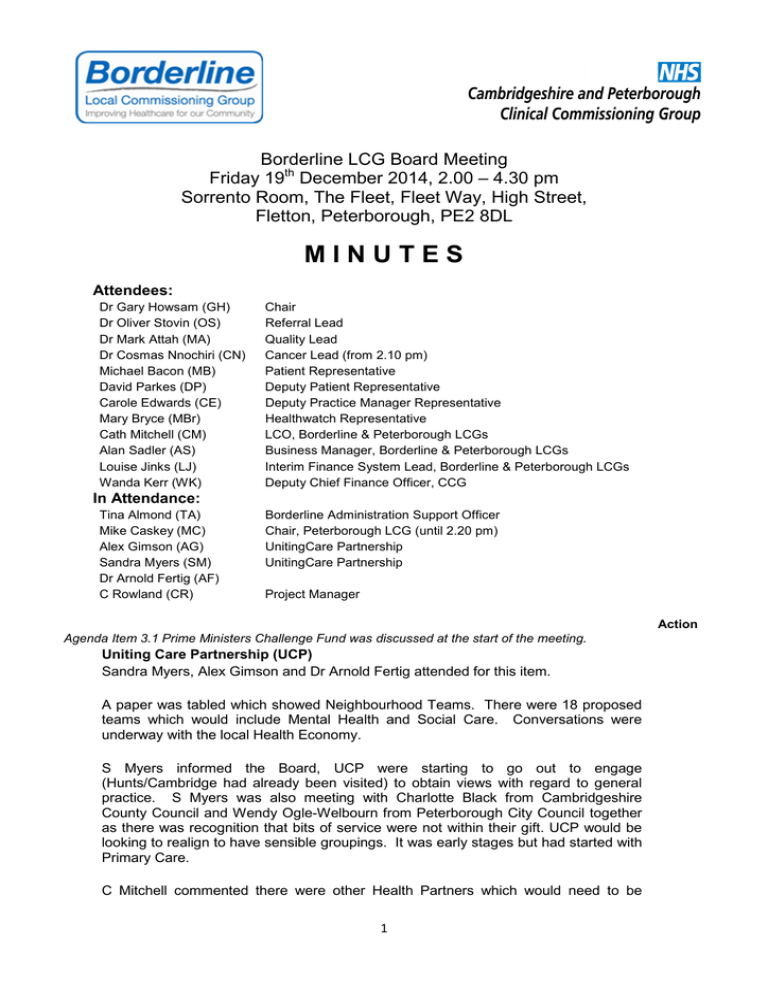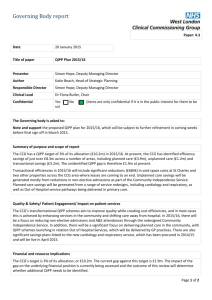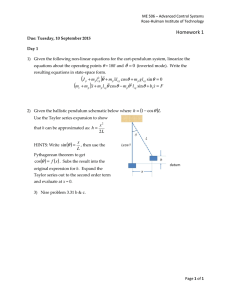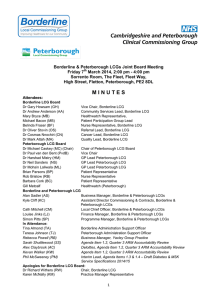Borderline Board Meeting Minutes 19th December 2014
advertisement

Borderline LCG Board Meeting Friday 19th December 2014, 2.00 – 4.30 pm Sorrento Room, The Fleet, Fleet Way, High Street, Fletton, Peterborough, PE2 8DL MINUTES Attendees: Dr Gary Howsam (GH) Dr Oliver Stovin (OS) Dr Mark Attah (MA) Dr Cosmas Nnochiri (CN) Michael Bacon (MB) David Parkes (DP) Carole Edwards (CE) Mary Bryce (MBr) Cath Mitchell (CM) Alan Sadler (AS) Louise Jinks (LJ) Wanda Kerr (WK) Chair Referral Lead Quality Lead Cancer Lead (from 2.10 pm) Patient Representative Deputy Patient Representative Deputy Practice Manager Representative Healthwatch Representative LCO, Borderline & Peterborough LCGs Business Manager, Borderline & Peterborough LCGs Interim Finance System Lead, Borderline & Peterborough LCGs Deputy Chief Finance Officer, CCG In Attendance: Tina Almond (TA) Mike Caskey (MC) Alex Gimson (AG) Sandra Myers (SM) Dr Arnold Fertig (AF) C Rowland (CR) Borderline Administration Support Officer Chair, Peterborough LCG (until 2.20 pm) UnitingCare Partnership UnitingCare Partnership Project Manager Action Agenda Item 3.1 Prime Ministers Challenge Fund was discussed at the start of the meeting. Uniting Care Partnership (UCP) Sandra Myers, Alex Gimson and Dr Arnold Fertig attended for this item. A paper was tabled which showed Neighbourhood Teams. There were 18 proposed teams which would include Mental Health and Social Care. Conversations were underway with the local Health Economy. S Myers informed the Board, UCP were starting to go out to engage (Hunts/Cambridge had already been visited) to obtain views with regard to general practice. S Myers was also meeting with Charlotte Black from Cambridgeshire County Council and Wendy Ogle-Welbourn from Peterborough City Council together as there was recognition that bits of service were not within their gift. UCP would be looking to realign to have sensible groupings. It was early stages but had started with Primary Care. C Mitchell commented there were other Health Partners which would need to be 1 included in conversations and what does Neighbourhood Teams mean. There would also need to be links into Oundle and Wansford. M Bacon raised concern via the Patient Forum. Borderline had separate issues to Peterborough and concern had been expressed that Borderline would be left in the border. A Gimson commented links to Social Care was not in procurement but that UCP were linking. The prime function in teams was to co-locate district nurses, community staff. Looking to put into West Group and East Group as a starter. There would be a proportion percentage share of over 65’s and would be weighted on a deprivation basis, life expectancy and deprivation index. M Attah asked with regard to structure, what were the functions of the Teams and how would we access? A Gimson responded, the teams would include; • Community Matron • Administration Support • District Nurse • Community Mental Health • Therapists Each practice would have 1 named person assigned to the practice. With regard to access of the teams, core working hours would be extended, although OOhrs would be very limited. G Howsam asked what the plan was on day 1, what were the expectations for practices. S Myers responded there would be caveats on day 1. Some skill sets would be there, but not all. We would be looking to up-skill staff. Some staff would already be trained from day 1 and ready to go and some would require training. We would also be looking to recruit to vacancies. M Attah asked for an ease of access example; A Gimson responded; • Visit patient • Phone team member (single point of contact) • Team member to contact relevant service you require G Howsam commented Lakeside would morph into UCP which would also link into the Better Care Fund (BCF). S Myers informed the Board that she would circulate a copy of the ‘submission statement’ if Board members wished to see. M Attah asked how vacancies would be dealt with. A Gimson confirmed vacancies would be recruited to, but this could not take place until TUPE of current staff was undertaken. Once TUPE of current staff had been undertaken, then the vacancies would be advertised. O Stovin asked with regard to the ‘purple’ group within the Neighbourhood table; Community based service, we will have a named nurse and there would be central base for the team. How are UCP going to decide where these teams are to be 2 based? S Myers responded that each practice would have their named team and would be located where the practice/s were able to accommodate. A Gimson said there was a need to devolve community care to practice level. M Attah asked with regard to Intermediate Care, how would this fit in. S Myers responded UCP were looking across the whole CCG at number of beds. UCP would be looking at how the beds were utilised and whether they were being used appropriately as well as looking at how to move flow of patients. C Mitchell commented it was about the right people going into the CCC, being able to use ‘step up’. There was good turnover within CCC beds. (14 days) C Rowland asked what the proposals were with regard to next steps. A Gimson responded the first proposal had been circulated to the CCGs for comments/feedback and requested Borderline comments be completed by 5th January 2015. C Edwards asked about IT solution, as Oundle were currently using EMIS web. S Myers responded the IT solution was to have a single view of information. A Gimson informed the Board if they wished to feedback with regard to the Neighbourhood Teams he would be happy for them to do so. A Gimson also said that should Borderline & Peterborough LCGs want to cross boundaries, they could as UCP would like LCGs to have ownership. G Howsam thanked Alex, Sandra, Arnold and Chris for attending and suggested Board members feedback to their individual practices. C Mitchell highlighted a potential issue with regard to re-location of Peterborough practices. Area Team were pushing with regard to rental services. LCG have pushed back to Area Team, but there could potentially be conversations around rental services going forward. B Fraser said she was concerned about where the staff would come from, as there were workforce issues. 1. 1.1 GENERAL ISSUES Apologies Apologies were received from Dr Rhiannon Nally, Rebecca Powell, Simon Pitts and Kyle Cliff. 1.2 Minutes of meeting held on 5th December 2014 The minutes from the meeting held on 5th December 2014 were agreed as an accurate record. 1.3 Action Log – 5th December 2014 Action 031/14 had been completed. Action 030/14 – PDMA 3 Discussion took place with regard to the PDMA. A Sadler informed the Board he had emailed Matthew Smith. C Mitchell commented Borderline LCG would need to take hold of the PDMA themselves and should think about what was needed. C Mitchell highlighted a few options to look at and suggested thinking about what pathways may need to be changed next year; • Asthma • COPD • Diabetes G Howsam suggested going back to the very first ‘IDEAL Agreement’; • would be easier to administer • engage with UnitingCare Partnership (UCP) • provider entity • need face-to-face time • use money to pay practices to attend meetings (engagement) O Stovin commented that Referral Leads Meetings/Prescribing Meetings were still being undertaken and that engagement was good, although attendance rate had fallen at Jamborees. G Howsam suggested having 10 meetings, each practice to provide cover on a rota basis for the Jamborees; payment could then be paid via the PDMA. C Mitchell commented, could be linked to clinical pathways/QIPP/UCP etc. C Mitchell and A Sadler to progress PDMA conversations already being undertaken. Action: CM/AS to progress PDMA conversation already being undertaken. 2. 2.1 GOVERNANCE Declarations of Interest No declarations of interest were received. 2.2 Terms of Reference The Board agreed the Terms of Reference, subject to adding an annex listing all GP practices within Borderline LCG. Action: ToR - TA/AS to add Annex listing Borderline LCG practices. 3 3.1 COMMISSIONING & STANDING ITEMS Prime Ministers Challenge Fund M Caskey attended for this item. Draft letter from M Caskey and G Howsam was tabled for Board members. M Caskey informed the Board there had been various conversations with regard to the ‘Prime Ministers Challenge Fund’ • Service Provision (extended opening hours to allow better access to Primary Care Services) • Diversification (financial) • Messages from CMET were good and CCG bids would be encouraged/CCG Management Team support a bid • LMC are of the opinion that this should be on a wider scale Both M Caskey and G Howsam, as Chairs, were trying to engage with the Board with 4 CM/AS TA/AS regard to co-commissioning of primary care in looking at opportunities available here and now. G Howsam commented in terms of CCG direction of travel and with PMS contracts changing, there was potential to invest. The CCG would take on responsibility with initial direction of travel. It would be easier to deal with bigger entities rather than 108 practices; • Vertical integration • Community based specialist services • need to keep practices financially viable • practices already talking to one another to try to find a way forward • Some practices would become non-viable • Primary Care Foundation was a good thing and we should take the opportunity to work with the CCG Management Team to put in a bid M Caskey said it did not mean practices had to sign up for 8am – 8pm working, but that practices could sign up to become an ‘entity/federation’. 8am - 8pm could be delivered in practice but could be slimmed down to a rota basis. Weekends we could use ED and utilise some of the resource to reinforce Lakeside within ED. If the Board agree to the letter being circulated, A Sadler could then follow up with practice managers during the next couple of weeks. Submission would need to be in by 16th January 2015. This could act as catalyst to bring practices together. We could federate in March 2015 8am-8 pm and join UCP. O Stovin commented that geography was the biggest problem. Slightly different in Borderline. C Mitchell responded the CCG configured for a different purpose. We could look to ignore geographic boundaries and challenge the CCG. O Stovin said he fully supported but would want whole general practice to be viable. OOhrs had deteriorated. G Howsam suggested finding a solution around geographic area. C Mitchell responded with regard to OOhrs/111, procurement of OOhrs was phase 1. We could have phase 2, was there anything else that could be added. Board agreed to the circulation of the letter. Action: TA to circulate letter to Borderline & Peterborough LCGs to include Practice Managers, GPs, Nurses etc.on behalf of M Caskey and G Howsam. TA A Sadler was asked to organise three ‘Prime Ministers Challenge Fund’ meetings to take place on 5th, 6th and 7th January 2015 from 7 – pm at CCC. Management support would be required. Action: A Sadler to organise three ‘Prime Ministers Challenge Fund’ meetings to take place 5th, 6th, 7th January 2015 from 7 – 9 pm. AS Discussion with Uniting Care Partnership took place following this item. 5 3.2 BLCG Leadership and PDMA Budget Report L Jinks presented the financial overview for November 2014 to the Board and highlighted the key points within the report as below; • • • • • the LCG was reporting a year to date surplus of £11k and forecasting a year end surplus of £15k on the leadership costs. an accrual was included at the end of 2013/14 for clinical leadership costs which had yet to be invoiced for. After all expected outstanding invoices had been paid it would leave a credit balance of £19k. This gave a year to date total LCG Leadership underspend of £30k and forecasted a year end underspend of £34k. to give a true reflection of the work clinical leads were doing, joint clinical lead costs had been moved between LCGs based on the fair share calculation. £1k underspend was forecast at year end on the OPP clinical leadership costs. PDMA costs had been accrued to budget with no variance reported. C Mitchell informed the Board she had met with M Caskey and G Howsam to discuss Mental Health Lead. The Clinical Lead post would be re-advertised. Sessions would be reviewed when advertised. The Board noted the financial position as at month 8 (November 2014). 3.3 BLCG Monthly Finance Report L Jinks reported on the Monthly Finance Report for Month 8, November 2014. LCG Summary – Table 1 on Page 3 of the report Total LCG Devolved Programme Budget FOT LCG Devolved Programme Budget M8 M7 Movement Deficit £2.544m Deficit £2.063m Deficit + £0.481m Deficit £4.072m Deficit £4.006m Deficit + £0.066m • From month 6 the CCG central reserves had been matched to plan. This was to make the position that each LCG was being asked to manage more obvious and transparent. • The areas with forecast overspends were: • PSHFT over-performance of £2.834m (£2.656m M7), mainly consisting of : Non-Electives £0.985m (£1.106m M7) includes MRET adjustment Outpatients £0.588m (£0.499m M7) Daycases £0.457m (£0.484m M7) • CUHFT £0.104m (£0.171m M7) • Other Acute: Leicester £0.108m (£0.122m M7) Fitzwilliam £0.415m (£0.386m M7) RNOH £0.113m (£0.091m M7) • East of England Ambulance £0.162m (£0.162m M7) • Continuing Health Care £0.564m (£0.600m M7) • GP Prescribing £0.593m (£0.629m M7) • Prescribing data for 6 months had now been received and the forecast position had been calculated by MMT using a local profile which continued to be based on the assumptions of 2.68% growth, £2m CCG Primary Care, QIPP savings and the 6 mid year national drug tariff changes. CCG Summary – Tables 2 and 3 on Page 4 of the report Local Commissioning Group FOT Devolved Budget Variance £'000 FOT Devolved Budget Variance % Rag Rated Borderline Peterborough CamHealth CATCH HCP HH IOE W isbech CCG (£4,072) (£2,802) (£822) (£2,195) (£2,844) (£1,340) (£3,891) (£2,655) (£20,621) (3.80)% Red (2.00)% Amber (1.10)% Amber (1.10)% Amber (2.20)% Amber (2.60)% Amber (4.00)% Red (4.70)% Red (2.40)% Amber • Year to date Total devolved Programme Budget to LCGs = Deficit £13.401m • Forecast Year Total devolved Programme Budget to LCGs = Deficit £20.621m. • Year to date Total Programme Budget after CCG Central Budgets = Deficit £0.702m. • Forecast Total Programme Budget after CCG Central Budgets = Breakeven • The year to date programme budget deficit position of £13.401m was after being offset by a surplus on running costs of £0.262m. In addition, a Central budgets surplus of £12.699m was being used to reduce the CCG year to date deficit position to £0.702m and a forecast year end breakeven position. • There were three main areas where the CCG would need to focus its attention to mitigate the financial risk and learning from 2013/14 financial recovery plans; • A strong focus on QIPP delivery, to be led by LCGs supported by central CCG Programme Office. • This would include fortnightly meetings with Project Managers with the Director of Performance & Delivery in addition to the monthly Confirm & Challenge meetings and the Financial Recovery Plan Board. • Active and more consistent contract management, to be led by the LCG contract teams supported with finance and information leads. • The running cost budget had been adjusted to reflect the £2m QIPP reduction. With tight control of appointments etc. it was previously thought it would be feasible to reach the stretch target of £2.5m. However, due to recent pressures this stretch target looked more doubtful. Nevertheless, tight control and management of this area of spend would continue as there was a 10% reduction in CCG running costs expected for 2015/16. The Board thanked L Jinks for the update with regard to Month 8, November 2014. 3.4 2014/15 QIPP Update The Board noted the total QIPP target for Borderline LCG was £3.690m and noted the QIPP summary as at October 2014 highlighted below for information: 7 QIPP SUMMARY - OCTOBER 2014 Urgent Care RSS/ Clinical Thresholds MSK Ophthalmology Total QIPP Programme • • • • Full Year Plan £'000 728 411 132 214 1,485 Running Costs Total 14/15 QIPP 253 1,738 QIPP Reported at CCG Level Total 14/15 QIPP 1,952 3,690 Plan to Actual to Date Date Variance £'000 £'000 £'000 429 281 -148 245 -149 -394 77 -128 -205 125 73 -52 876 77 -799 148 1,024 299 376 151 -648 QIPP was being monitored monthly via Confirm and Challenge meetings by the PMO and LCG Management Team. Work was on-going by the LCG Management Team to investigate performance and non-delivery of QIPP schemes. Due to over-performance of the acute contracts and the non-delivery of QIPP schemes all LCGs were to produce Recovery Plans. The target was to bring each LCG back to its planned surplus or planned deficit position. As a minimum it had been agreed that each LCG needed to deliver 50% of their gap and for Borderline LCG as at Month 7 this was £2m. We need to recognise the targets and then quickly move onto getting real and robust schemes which get as close to target as possible in the remaining months available. Business Case Overview Urgent Care Front Door Discharge Team: FY Target £213k, YTD Delivered £154k. Savings were based on the team avoiding 275 admissions in 2014/15. The number of avoided admissions was 200 up to the end of October 2014. Savings for the first three months of the year were based on a fair shares split as we do not have the number of avoided admissions by practice or LCG. The Admission Avoidance Team was using a new template from July 2014 to capture data at LCG level and the savings figures now reflect this. The FIRM 2: FY Target £363k YTD Delivered £76k. Savings were based on the team avoiding 480 admissions in 2014/15. The number of avoided admissions was reported as 99 for April to September 2014 which was 141 below target. Reporting avoided admissions was still at Trust level despite requests to provide the data at LCG level. The contract with CCS to provide The FIRM came to an end as at 30th September 2014. MDT: FY Target £65k YTD Delivered £48k. These savings were based on a CCG wide assumption of achieving 3% reduction in non-electives and A&E attendances. Care Home Scheme: FY Target £55k, YTD Delivered £0. The Care Home Educator was now in post as from September 2014. Currently working on identifying savings and these would be included in the report next month. Carers Prescription Service: FY Target £32k, YTD Delivered £2k. Savings were based on avoiding 42 admissions in 2014/15. The project had avoided 3 admissions in June to October 2014 which was 22 below target. RSS and Clinical Thresholds 8 FY Target £411k, YTD Delivered £-149k. The savings calculated was by LCG using SUS data. In previous months savings had been calculated using an average cost. From August 2014 the calculation was based on actual costs. Savings could be seen in knee replacements, knee anthroscopy, carpal tunnel and tonsillectomy. Due to the overall increases in first outpatient appointments there have been no savings in RSS. MSK: FY Target £132k, YTD Delivered £-128k. SUS data was now going through DSCRO and work was ongoing to validate the data. Some discrepancies had been found within the elective inpatient data and are therefore using an average cost to calculate savings until this was corrected. Ophthalmology: FY Target £214, YTD Delivered £73k. An increase in referrals was reported away from the acute setting and could now start to see some savings in the reduction in follow-ups, although these were below plan. Board had discussion around ‘Fair Shares’ and QIPP targets. W Kerr informed the Board from next year everyone would have the same QIPP targets. There was currently 4.5% of spend and the notion of ‘Fair Shares’ was changing going forward. It would be age weighted rather than deprivation weighted. G Howsam commented with regard to page 2, mitigating financial risk, do you think we have a chance with regard to QIPP savings. L Jinks responded some savings were being made and we were moving in the right direction and referred to page 2, the Recovery Plan. Achievement was being made on contractual measures. O Stovin said we were still in a position where we were spending more than what we had. M Attah raised concern with regard to Ambulatory Care. He was anxious around synergy groupings. C Mitchell commented S Pitts was working to set up a meeting with all agencies to try to provide a solution for Ambulatory Care. G Howsam commented with regard to MDT, we were always going to hit target and Carers Prescription would be going into the Better Care Fund (BCF) next year. L Jinks responded, we had achieved with regard to MDT, the figure should be 0 as unable to validate. Board discussed ‘follow ups’. M Attah said that K Cliff, who was undertaking a review of Acute Contracts, had started to see a reduction. 4. 4.1 ANY OTHER BUSINESS Feedback from COBIC Workshop Board members gave feedback from the COBIX Workshop; O Stovin enjoyed the session, but was not sure it was value for money. B Fraser felt the session was a bit rushed. M Bacon found the session useful. G Howsam had the presentation slides which were good, but also felt it was not value for money. A Sadler said it was a useful discussion. M Attach felt that it was useful, but not value for money. 4.2 O Stovin Retirement 9 The Board noted it was O Stovin’s last Board meeting due to retirement and thanked OS for all his hard work/commitment and wished him well in his retirement. 4.3 Meetings D Parkes asked why the Board held two Board Meetings a month. G Howsam responded, Borderline LCG had always held two Board meetings a month and members found the meetings useful. L Jinks queried when Finance Reports could be taken in the alternative months when the Board Development Session was being held. G Howsam responded, he was happy for the Finance items to be reported at the beginning of the Development Sessions. Date & Time of Next Meeting: Friday 9th January 2015, 4.00-5pm, Sorrento Room, The Fleet, Fletton, Peterborough, PE2 8DL There being no further business, the meeting closed at 4.15 pm. Contact Details Name: Tina Almond Email: tina.almond@nhs.net Telephone 01733 704452 10



